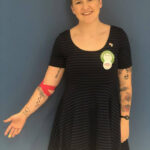Tattoos are a powerful form of self-expression, a way to adorn your body with art that reflects your personality, passions, or significant life events. For new mothers, the desire to celebrate motherhood with a tattoo might arise. However, if you are breastfeeding, you might be wondering about the safety of getting inked. The question, “Can I get a tattoo while breastfeeding?” is common, and it’s important to understand the potential risks involved. While the allure of new body art is strong, it’s generally advised to postpone getting a tattoo until after you have finished breastfeeding.
Understanding the Concerns: Tattoos and Breastfeeding
While there isn’t extensive research specifically on tattoos and breastfeeding, health professionals generally recommend erring on the side of caution. The primary concerns revolve around the potential risks associated with tattooing and how they might impact both the breastfeeding mother and her baby.
Risk of Infection
One of the most significant risks associated with tattooing is infection. Tattooing involves breaking the skin barrier, creating an open wound that is susceptible to bacterial infections like Staphylococcus aureus and Streptococcus, as well as viral infections such as Hepatitis B, Hepatitis C, and HIV. Although reputable tattoo studios maintain strict hygiene standards, including sterilization and using disposable needles, the risk of infection is never completely eliminated.
If a breastfeeding mother develops an infection from a new tattoo, it could lead to complications that might affect her health and potentially her ability to care for her baby. While it’s unlikely that a localized skin infection would directly transmit to breast milk, a systemic infection requiring antibiotics could necessitate a temporary pause in breastfeeding, depending on the medication prescribed.
Tattoo Ink and Breast Milk
Another concern is the theoretical risk of tattoo ink entering the bloodstream and subsequently breast milk. Tattoo ink particles are deposited into the dermis, the layer of skin beneath the epidermis. While the body’s immune system traps most of the ink particles, some very small nanoparticles could potentially migrate into the bloodstream.
Currently, there is limited research on the composition of tattoo inks and their potential transfer into breast milk. Most tattoo inks are not FDA-approved and can contain a variety of pigments and chemicals, including heavy metals. The long-term effects of these substances, even in trace amounts, on infants through breast milk are unknown. Due to this lack of definitive data and the precautionary principle, it is generally recommended to avoid potential exposure.
The Healing Process and Your Body
Getting a tattoo places stress on your immune system as your body works to heal the tattooed area. Breastfeeding itself is also a physiologically demanding process. Combining these two factors could potentially strain your body. Furthermore, the healing process for a tattoo can take several weeks, requiring careful aftercare to prevent infection and ensure proper pigment retention. This added responsibility might be challenging for a new mother already adjusting to the demands of infant care.
When is it Safe to Get a Tattoo After Breastfeeding?
To minimize any potential risks, it is generally advised to wait until you have completely finished breastfeeding before getting a tattoo. This allows your body to fully recover and reduces any theoretical risk of ink exposure to your baby through breast milk.
After you have weaned your baby, it is still wise to consider giving your body some additional time to recover before undergoing a tattoo procedure. Consulting with your doctor is always a good idea, especially if you had any complications during pregnancy or postpartum. They can provide personalized advice based on your health status and help you determine the most appropriate time to get a tattoo.
Alternatives to Consider
If you’re eager to express yourself with body art but are currently breastfeeding, consider temporary alternatives like henna tattoos. Henna is a natural dye that stains the top layer of the skin and fades over a few weeks. It’s a safe and beautiful way to enjoy body art without the risks associated with permanent tattoos.
General Tattoo Safety Considerations
Regardless of whether you are breastfeeding or not, choosing a reputable tattoo artist and studio is paramount. Ensure the studio adheres to strict hygiene practices, including:
- Sterilization: Using an autoclave to sterilize reusable equipment.
- Disposable Needles: Employing single-use, disposable needles that are opened in front of you.
- Gloves: The artist should wear fresh, disposable gloves throughout the tattooing process.
- Cleanliness: The studio environment should be clean and well-maintained.
Additionally, discuss any allergies or skin sensitivities you have with your tattoo artist beforehand. Following proper aftercare instructions provided by your artist is crucial for preventing infection and ensuring your tattoo heals well.
Prioritize Safety and Make Informed Decisions
While the desire for a new tattoo is understandable, especially during significant life transitions like motherhood, it’s essential to prioritize the health and well-being of both yourself and your baby. Given the potential risks, though currently not fully understood, associated with getting a tattoo while breastfeeding, it is generally recommended to wait until after you have finished breastfeeding. This approach allows you to celebrate motherhood with body art safely and responsibly, ensuring peace of mind and the health of your little one. When in doubt, always consult with healthcare professionals for personalized medical advice.

